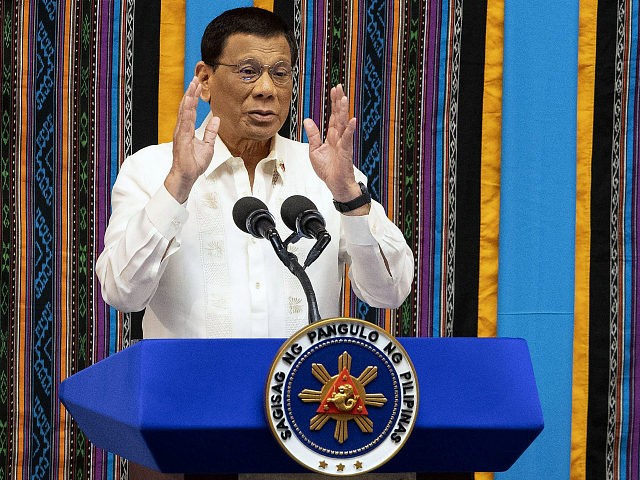Filipino President Rodrigo Duterte went to Beijing on Wednesday to discuss his country’s territorial claims in the South China Sea and, at the same time, push for speeding up Chinese projects in the Philippines.
Chinese ships have docked on the Spratly Islands, located within Philippine-sovereign territory in the South China Sea. The Philippines is one of several regional countries engaged in a territorial dispute with Beijing, which claims nearly all of the South China Sea.
In 2016, a ruling by the international tribunal in the Hague invalidated China’s claim to sovereignty over the region, including the areas disputed by the Philippines.
The Filipino president is expected to bring up the court’s findings during his meeting with Communist Party leader Xi Jinping.
Reuters noted Wednesday:
Despite his huge domestic popularity and great affection for China, Duterte is under growing pressure to push back at its growing maritime assertiveness. After avoiding the issue for three years, he has vowed to raise with Chinese President Xi Jinping a 2016 arbitration ruling that invalidated China’s claim to sovereignty over most of the South China Sea.
Via a state-run news outlet, Beijing cautioned Duterte against steering away from his approach of downplaying the South China Sea dispute since he was elected to office.
On Tuesday, the Global Times reported:
As the president of the Philippines, Duterte’s foreign policies are based on national interest of the Philippines and the deterioration of relations with China is harmful to the national interest of the Philippines.
…
As the competition between China and the US is intensifying, the further development of Sino-Philippine relations is of great practical significance for both China and the Philippines. For Manila, although Washington is a military ally, Beijing is its largest trading partner. When it comes to core national interests, the Philippines may not choose to stand by the US.
…
We must continue to build a harmonious, secure and prosperous neighborhood and adhere to the policy of amity, sincerity, mutual-benefit and inclusiveness toward its neighbors so as to build a community of shared future with neighboring countries and create a favorable environment for China’s rise.
The Philippines has signed on to China’s global infrastructure project known as Belt and Road Initiative (BRI).
Duterte is expected to push for fast-tracking Chinese projects, including joint oil and gas exploration and exploitation efforts. The Filipino leader’s visit to China marks his second in less than five months.
Duterte attended the Second Belt and Road Forum for International Cooperation in Beijing in April of this year.
The Global Times refuted U.S. assertions that Beijing is using the BRI as a vehicle for “predatory” lending practices, namely “deb traps,” intended to bury borrowing countries in unsustainable debt.

COMMENTS
Please let us know if you're having issues with commenting.